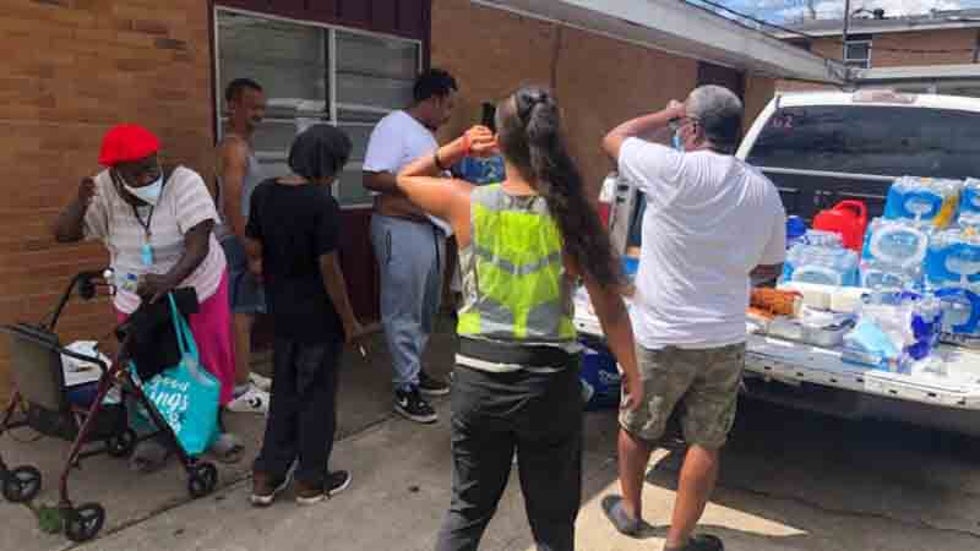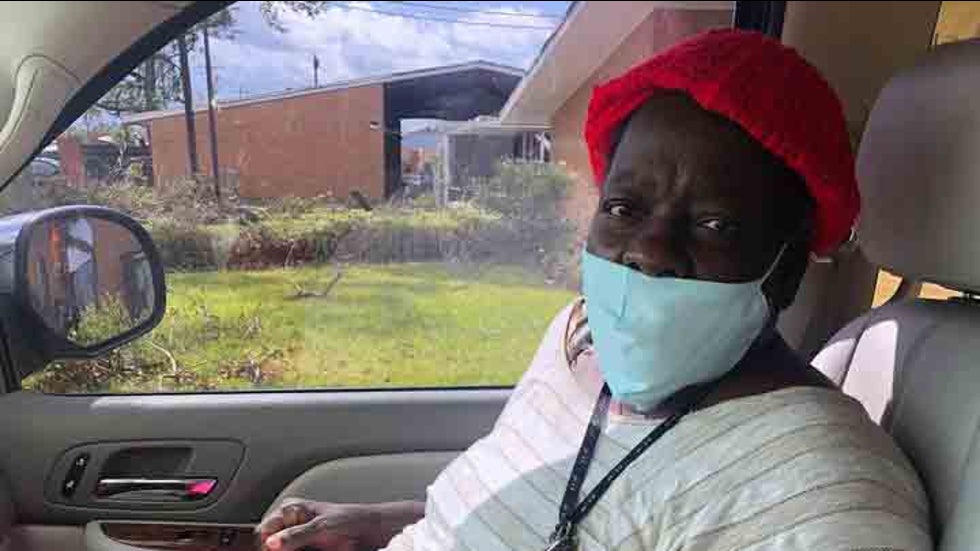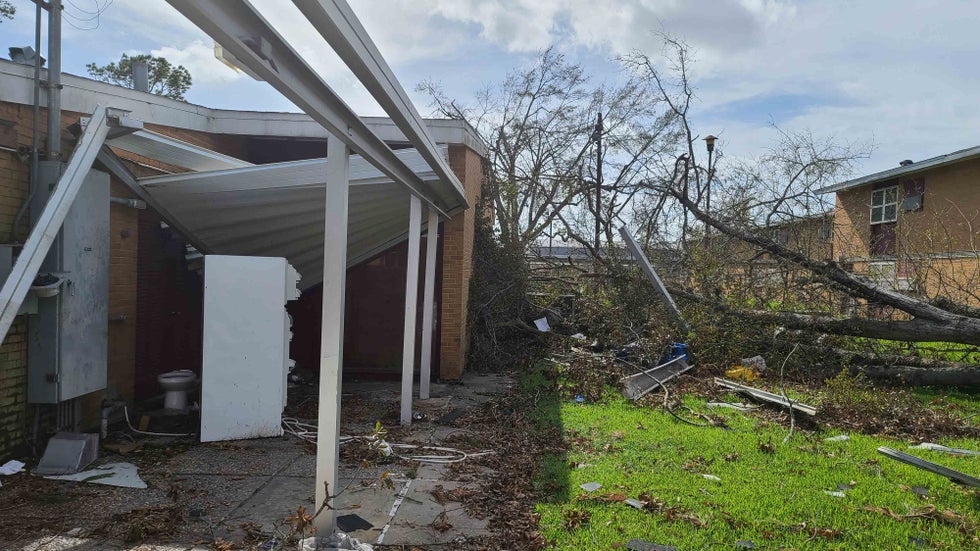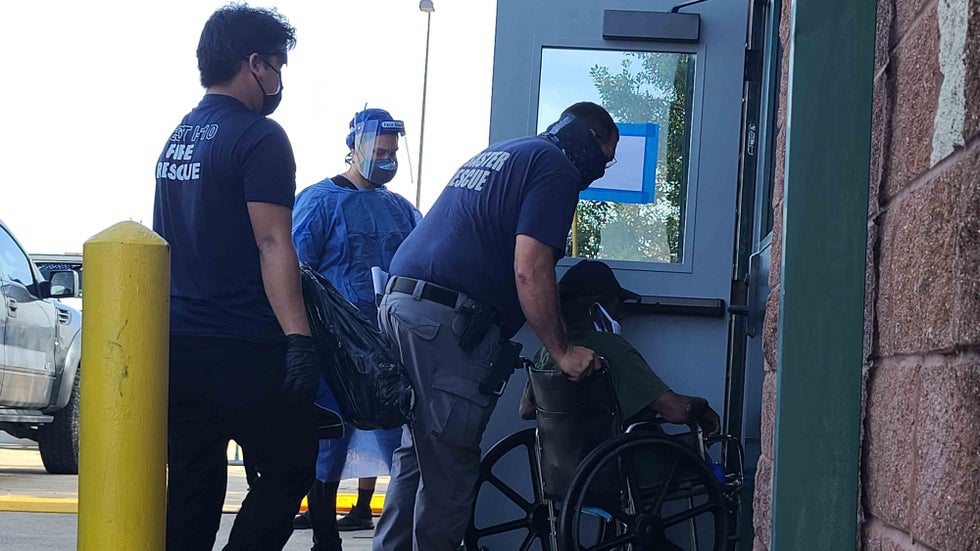Jan Wesner Childs
Janice Chagois, a 64-year-old who has congestive heart failure and uses a walker, slept in the open outside her low-income apartment complex in Lake Charles, Louisiana, for two nights after Hurricane Laura pummeled the city on Aug. 27.
Chagois was one of about a dozen residents of the Golden Arms apartments, all of them low income, most of them elderly and many of them disabled, who survived the storm only to be stranded with no power, no water, no medical care and no first responders rushing to their rescue, despite repeated calls for help.
"Personally, I don’t think I would have made it," she said of what might have happened if volunteer civilian rescuers hadn’t stumbled upon them by chance more than 24 hours after the storm passed.
Those rescuers say they made more than 80 calls over the course of three days to city, parish and state agencies on behalf of Chagois and her neighbors, but none came to assist. Now they're demanding an investigation and changes to disaster planning for public housing complexes like Golden Arms, which aren’t required by law to have an evacuation plan.
Chagois and others familiar with the situation talked to weather.com in a series of phone interviews last week about what happened at Golden Arms. The incident is also detailed in a 26-page after action report (AAR) posted online by CrowdSource Rescue, the group that evacuated the residents some 72 hours after the storm made landfall.
"It sort of breaks your heart in a lot of ways," said Matthew Marchetti, co-founder of CrowdSource Rescue.
 Residents of Golden Arms apartments in Lake Charles, Louisiana, were evacuated by volunteers after waiting days for help.
Residents of Golden Arms apartments in Lake Charles, Louisiana, were evacuated by volunteers after waiting days for help.A Three-Day Ordeal
Lake Charles was devastated by the storm – roofs were ripped off, windows blown out of buildings, trees down, power lines knocked over like dominoes. Through it all, Chagois and her neighbors did everything they could just to stay alive.
The lack of electricity meant no air conditioning in the stifling heat, and that aggravated her life-threatening heart condition.
"I didn’t panic because I knew if I panicked, it would hasten those symptoms," said Chagois.
(MORE: Hurricane Laura: First Southwest Louisiana Category 4 Landfall on Record)
James Lea, a volunteer with nonprofit disaster response organization Aerobridge, was driving down a street in Lake Charles on Aug. 28, the day after Laura hit. He stopped to offer someone a bottle of water, and the person told him about a nearby group of elderly people in distress.
Lea drove up to Golden Arms. The residents told him they were hungry, missing medication and some needed medical attention. Lea's first step was to walk to a National Guard base just across the street. A guardsman said he had called 911 and 211 (a social services helpline) repeatedly to report the situation and had brought it to the attention of his commanders, according to the AAR.
 Janice Chagois was among more than a dozen residents who were stranded at a low-income apartment complex in Lake Charles, Louisiana, following Hurricane Laura.
Janice Chagois was among more than a dozen residents who were stranded at a low-income apartment complex in Lake Charles, Louisiana, following Hurricane Laura."By the time we had got there, there was no power, most of their cell phones were dead, so they weren’t able to make calls directly anymore," Marchetti said. "And that’s when we started getting involved and basically called everybody under the sun who we thought would listen."
Still, no assistance came. On Aug. 29, while Lea and others were making all those calls and being bounced from agency to agency, President Donald Trump visited the city and spoke at the National Guard base.
A spokesman for the Louisiana National Guard said allegations by CrowdSource Rescue that the agency shirked its duties by not helping the Golden Arms residents are unfounded.
"The Louisiana National Guard operates in a support role in coordination with local authorities and agencies," Sgt. First Class Denis Ricou said via email Wednesday afternoon. "We take the allegations made by CrowdSource Rescue very seriously and conducted an internal investigation into the alleged misconduct. The results of our investigation indicated that there is no evidence of neglect or wrongdoing by any Louisiana Guardsman. The LANG was not tasked to respond to the complex nor did we receive any mission assignment for evacuation support."
Volunteers marshalled by Lea and Marchetti eventually loaded the residents into their cars and drove them to several different locations, including a local airport where they were told help would be available. Their convoy was turned away. At one point, the group bided time in a Walmart parking lot. In the end, they shuttled Chagois and her neighbors to an evacuation center three hours away in Metairie, Louisiana, on Friday, Aug. 30, three days after they were hit by one of the strongest hurricanes to ever come ashore in Louisiana.
"They just wanted to be safe," said Marchetti. "They wanted to be in one spot and (be) OK."
A few went to state-provided hotel rooms. Most went to a designated medical shelter, where they were referred for additional care.
They 'Deserved Better Than This'
The AAR acknowledges shortfalls among some of the volunteers that came to help. There was confusion over whether some were representing a particular organization or not, and at one point, someone from an an unrelated organization left an evacuee at a Waffle House.
But it lays the blame squarely on government entities ranging from the local mayor’s office to state emergency management officials.
"This is a catastrophic failure on account of multiple agencies and systems," the report states. "These seniors deserved better than this."
 Damage at the Golden Arms apartments in Lake Charles, Louisiana, after Hurricane Laura.
Damage at the Golden Arms apartments in Lake Charles, Louisiana, after Hurricane Laura.Marchetti said the volunteers never should have had to intervene in the first place.
The Calcasieu Parish Police Jury, which oversees local emergency management, did not respond to phone calls or emails from weather.com seeking comment. The Louisiana Attorney General’s Office referred questions to the U.S. Department of Housing and Urban Development. The city of Lake Charles referred questions to the city housing authority, which manages Golden Arms.
Ben Taylor, director of the housing authority, was blunt in his response when reached on his cellphone Friday afternoon.
"It is not a nursing home," Taylor said of Golden Arms. "It’s an elderly designated apartment, but you have to be capable of independent living."
The building is no different than any other type of apartment complex where residents are expected to take care of themselves, he said.
When Lea arrived, he found one man sitting in a powerless electric wheelchair, stuck in a hot apartment. Others were in diapers. Some of the residents had home health care or other assistance, but those services were apparently on hold because of the storm.
(MORE: Is It Safe To Go To A Hurricane Shelter In The Era Of Coronavirus?)
Marchetti said the incident revealed faults in the system that need to be fixed.
"For instance," he said, "these sorts of facilities don’t have to have an evacuation plan. That’s crazy. Are you kidding me?"
Taylor said the residents should have left when an evacuation order was issued for the entire city before the storm, and that buses and hotel rooms were offered throughout the city to those who had nowhere to go and no way to get there.
"We had a mandatory evacuation and they chose not to do it," Taylor said.
Most of the Golden Arms residents did leave. But some of those who stayed behind said they didn’t know anything about transportation being provided, according to CrowdSource Rescue’s AAR. Buses reportedly showed up at the complex the day after the storm, before Lea arrived, but residents said drivers told them they were being diverted somewhere else.
It wasn’t clear if they knew about the free hotel rooms, which were provided to keep large numbers of people from congregating in group shelters during the coronavirus pandemic.
Taylor said first responders were extremely busy during and after Laura.
"The whole city needed help after the storm came through," he said.
Marchetti doesn’t think that’s an excuse for not showing up at Golden Arms sooner.
"I get it. It’s chaos. It’s nuts," in the hours and days after a disaster, he said. "The phone is going off the hook and everything. … The 911 call sheets are lighting up and everybody needs help everywhere. But the presumption is that the 911 authorities are working on the most pressing cases, which we considered this one pretty dang pressing."
At one point, on Aug. 29, ambulances and other emergency services arrived at Golden Arms. But they left after determining no one was in urgent need of medical care.
They did evacuate residents of another low-income complex, Chateau du Lac, who were also assisted by Lea and others. It’s not clear why they got help and Golden Arms didn’t. The two buildings are less than two miles apart.
Society's Most Vulnerable Face Greatest Threat From Disasters
The most vulnerable people are the least likely to leave their homes, and face the greatest risk during a hurricane or other disaster, according to Michelle Meyer, director of the Hazard Reduction and Recovery Center at Texas A&M University.
"In the U.S., the individuals most likely to be injured or die from a disaster are elderly persons or persons with disabilities," said Meyer.
 A resident from the Golden Arms apartments is helped into an evacuation center in Metairie, Louisiana, after Hurricane Laura.
A resident from the Golden Arms apartments is helped into an evacuation center in Metairie, Louisiana, after Hurricane Laura.Most of the residents at Golden Arms were both, in addition to being minorities and low-income, two other factors stacked against them when it comes to survival.
"We often talk about it not as a choice … they want to evacuate but they can’t," said Meyer.
Obstacles include transportation and the cost of gas, food and other expenses involved with evacuating.
Marchetti said it's a scenario he's seen play out in many of the disasters his group has responded to.
"So much of this intersects with issues of income and equality and, quite frankly, racial justice, where you have some of these people who are really more vulnerable in our society, where their outcomes are not good before the storm and then after the storm they don’t necessarily improve," he said.
And this year, COVID-19 is probably making it less likely that people will evacuate, Meyer added.
(MORE: Power Outage Repairs in Louisiana After Hurricane Laura Cost Up to $1.4 Billion)
For many, it comes down to simply not having a place to go where they feel comfortable.
"Family is usually most important when a disaster comes together, but in our culture today, we have much more seniors who are living alone or have family moving much further away," Meyer said.
Chagois said that’s exactly why she rode out the storm in her own home.
"I’ve never left," she said. "I’ve never had anywhere to go. I had to stay."
Where Are They Now?
No one knows what will happen to Chagois and her neighbors next.
"Some of the folks are in long-term care facilities, which is exactly where they need to be and that was sort of our entire goal with this, is they need to be placed into the 'system,' if you will, where somebody is in charge of making sure that these folks have the medical care they need," said Marchetti.
Taylor said Golden Arms wasn’t livable as of Friday because it still didn’t have electricity, although a half-dozen or so people were staying in their apartments despite being told to leave. Taylor said they were offered transportation to hotel rooms after the storm.
He hopes FEMA will bring trailers to the city to be used as emergency housing because there are so many people in need of safe shelter.
"It’s not just my clients that are affected, it is everybody … I don’t know of anybody that didn’t get some damage," said Taylor.
Chagois, meanwhile, is still out of town, staying with an acquaintance after a stint at a friend’s house and a three-day hospital stay.
"One day at a time," she said. "Right now, I can’t think long-term. I really can’t."
The Weather Company’s primary journalistic mission is to report on breaking weather news, the environment and the importance of science to our lives. This story does not necessarily represent the position of our parent company, IBM.
The Weather Company’s primary journalistic mission is to report on breaking weather news, the environment and the importance of science to our lives. This story does not necessarily represent the position of our parent company, IBM.

No comments:
Post a Comment